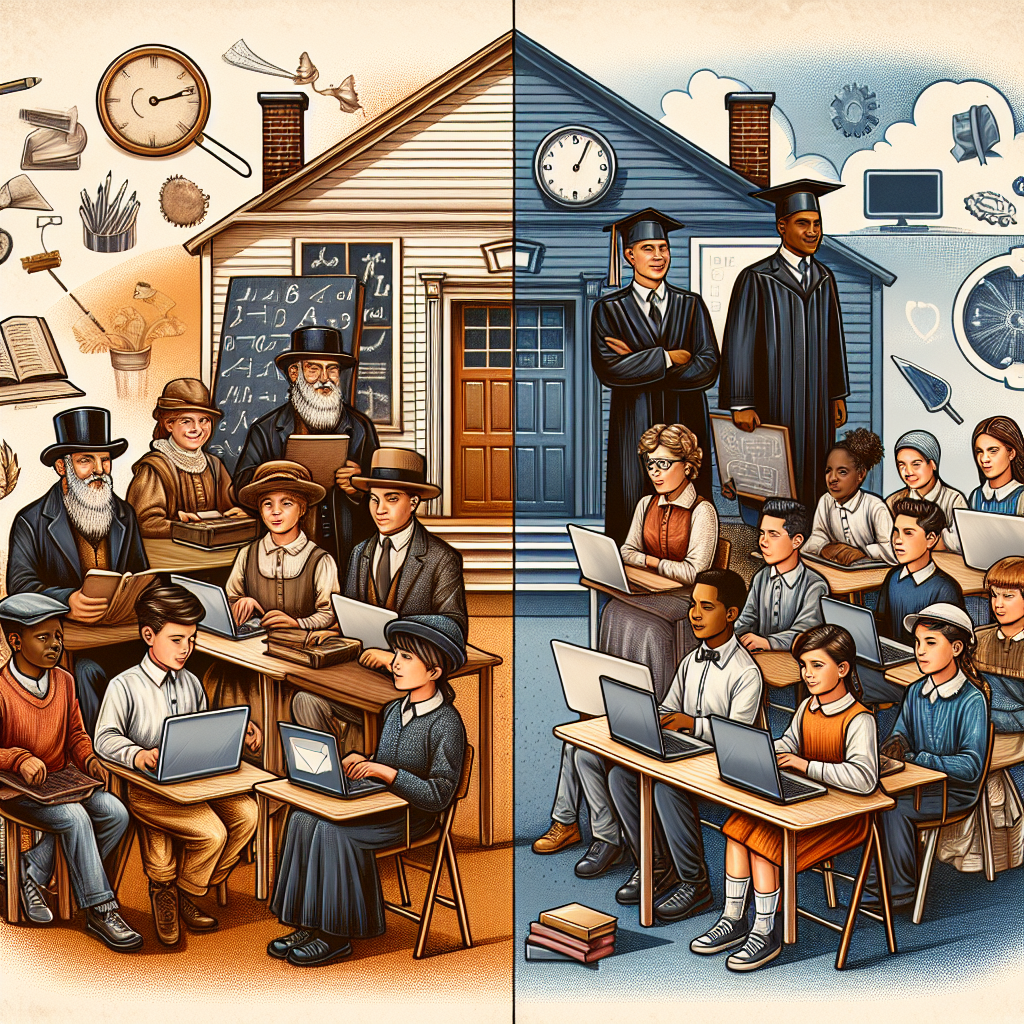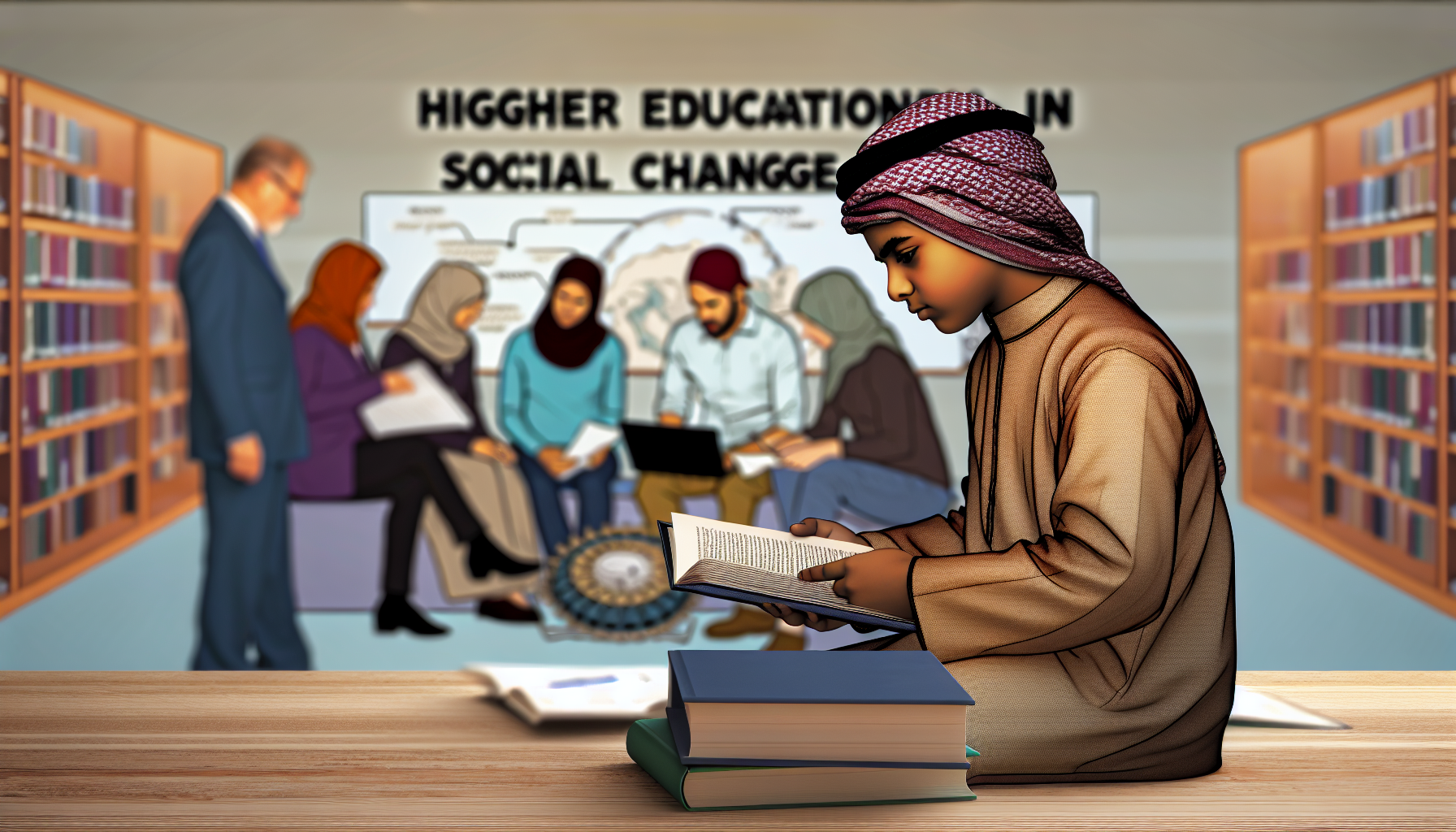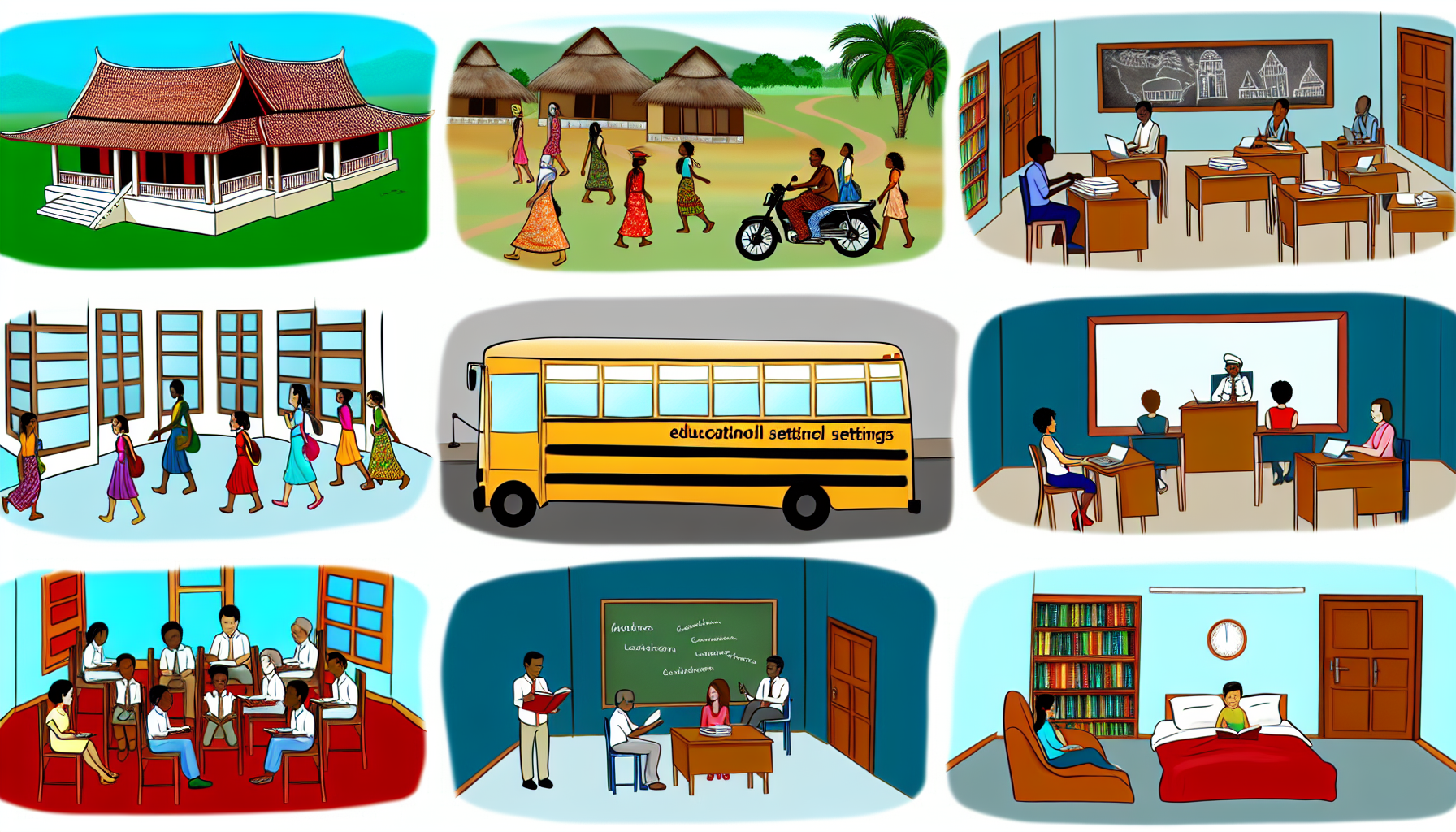Explore the profound impact of education on societal transformation throughout history. Delve into the evolving role of education in driving positive social change.

Education has long been recognized as a fundamental mechanism for driving social change. Historically, it has played a pivotal role in altering societal norms, challenging injustices, and promoting democratic ideals. The relationship between education and social change is marked by its ability to empower individuals with knowledge, thus enabling them to question existing systems and advocate for improvement. This interplay is significant as education acts not only as a tool for personal development but also as a catalyst for collective societal transformation.
Throughout history, various movements have illustrated the transformative power of education. For instance, the civil rights movement in the United States emphasized access to quality education as a means to achieve equality and social justice. Similarly, in many developing nations, educational initiatives have sought to elevate marginalized populations, thereby fostering socioeconomic development and reducing inequality. As such, education is inherently linked to the quest for social justice, making it an indispensable component of efforts aimed at creating a more equitable society.
In the contemporary context, discussions surrounding the role of education in social change remain relevant. The rise of technology and globalization has shifted the landscape of education, introducing new challenges and opportunities. Issues such as digital divide and access to quality education for marginalized groups continue to pose significant barriers to achieving holistic societal reform. Furthermore, the relevance of lifelong learning in today’s fast-paced world emphasizes the need for continual adaptation and knowledge acquisition, directly impacting individuals’ capacity to effect change.
This blog post will delve into these multifaceted themes, exploring how education has historically contributed to social transformation and examining its current implications. By analyzing various perspectives on education’s role in societal change, we aim to illuminate the ongoing interplay between these critical areas, providing insights into how we might envision a more just and equitable future through education.

Throughout history, education has served as a powerful catalyst for social change, deeply intertwined with critical movements that shaped societal structures. One of the most notable examples is the abolition of slavery in the 19th century. Educational initiatives aimed at enlightening both enslaved individuals and the general populace were pivotal in challenging the accepted norms of the time. Key figures, such as Frederick Douglass, utilized education not only as a tool for personal advancement but also as an instrument for broader societal transformation. Douglass’s speeches and writings underscored the inherent link between knowledge, liberation, and social equity.
Similarly, the civil rights movement of the 1950s and 1960s demonstrated the transformative value of education. Activists understood that to dismantle systemic racism, they needed to empower individuals through knowledge. Institutions like historically black colleges and universities (HBCUs) became breeding grounds for leaders such as Martin Luther King Jr. and Ella Baker, whose educational backgrounds facilitated their critical thinking and advocacy skills. The Freedom Schools of 1964 further exemplified how education was harnessed to challenge injustice by offering Black communities a curriculum that promoted social responsibility, critical analysis, and political engagement.
Moreover, the suffragette movement in the early 20th century highlights another aspect of education in social change. Women’s access to education was crucial in empowering them to seek equality and voting rights. Educated women, who understood their rights and the political landscape, became effective advocates for change. Figures like Susan B. Anthony and Elizabeth Cady Stanton are emblematic of how educational efforts could elevate marginalized voices to demand their rights vigorously.
These historical instances exemplify that education is not merely about acquiring knowledge but encompasses the ability to question existing societal norms and foster a collective desire for change. By analyzing key movements and figures, one can appreciate how the role of education has evolved yet consistently remained fundamental in shaping a more equitable society.

Higher education institutions have historically played a pivotal role in fostering social change, acting as catalysts for activism and innovation. Universities serve not only as educational repositories but also as spaces where critical thinking and social responsibility are cultivated. The unique environment within these institutions encourages students to engage deeply with societal issues, equipping them with the knowledge and skills needed to effect change in their communities.
Throughout the decades, various universities have been at the forefront of significant social movements. For instance, during the civil rights movement in the United States, campuses became battlegrounds for discourse, where students organized protests and campaigns advocating for equality and justice. Institutions such as the University of California, Berkeley, were particularly instrumental in shaping public policy and raising awareness about social injustices through student-led actions. This historical context demonstrates the inherent power of higher education in mobilizing young minds and challenging the status quo.
Moreover, contemporary universities continue to engage with pressing social issues through research and community outreach programs. Initiatives focusing on climate change, gender equity, and racial justice are being developed and implemented in collaboration with local organizations. For instance, many universities are establishing sustainability centers that not only teach about environmental issues but also partner with local communities to initiate practical solutions. These collaborations foster an atmosphere of shared responsibility and highlight the essential role of education in addressing global challenges.
In conclusion, higher education institutions serve as vital hubs for social activism and intellectual discourse. By promoting critical thinking and social responsibility, they empower students to take active roles in shaping a more equitable society. Through case studies and ongoing initiatives, it is evident that the impact of higher education on social change remains significant and multifaceted.
Teachers play a pivotal role in fostering social change by acting as agents of transformation within their communities. This responsibility extends far beyond traditional knowledge dissemination; it encompasses the promotion of social justice, equity, and empowerment among students. Educators can employ various teaching methodologies that prioritize these principles, thereby influencing not only individual lives but also the broader societal fabric.
One of the essential methods educators use is critical pedagogy, which encourages students to question societal norms and engage in discussions surrounding power, privilege, and inequality. Through this approach, teachers cultivate an awareness that empowers students to become active participants in their communities. For instance, a teacher may integrate lessons on historical injustices or contemporary social issues into the curriculum, prompting students to reflect on their roles in advocating for change.
Moreover, teachers often implement community-based projects that engage students with local organizations, allowing them to apply what they learn in the classroom to real-world situations. Such initiatives not only benefit the community but also instill a sense of responsibility and agency in students. For example, a high school teacher who collaborates with a local food bank might guide students in developing a campaign to address food insecurity, thus enabling them to experience firsthand the impact of their efforts.
Testimonials from students underscore the transformative influence teachers can have. Many individuals express gratitude toward teachers who challenged them to think critically, encouraged active civic participation, and fostered an environment of inclusivity. These experiences lay the groundwork for future leaders committed to promoting social change. The role teachers play in shaping the values and actions of their students serves to underscore the significance of education in the ongoing pursuit of a just and equitable society.

Education remains a pivotal force in social transformation, yet contemporary issues and challenges continue to hinder its potential impact. One of the most pressing challenges is inequality in educational access and quality. Marginalized communities often face systemic barriers that limit their opportunities for learning and personal development. These disparities not only affect individual lives but also perpetuate cycles of poverty and social stratification. This inequity is evident in various forms, including socioeconomic status, race, and geographical location, which dictate the type and quality of education available to different populations.
Moreover, many educational systems struggle with outdated curricula that do not address the current societal needs, further impeding social change. Traditional pedagogies may neglect critical thinking, cultural awareness, and inclusivity, which are essential for fostering a generation capable of navigating and addressing contemporary social issues. This hindered adaptability can be detrimental in preparing students for an increasingly complex world.
Despite these challenges, there are notable innovative education programs and movements that strive to create change. Grassroots organizations and educational initiatives have emerged, focusing not only on access but also on the enhancement of educational quality. Programs tailored to underrepresented groups emphasize culturally relevant pedagogy and community involvement, demonstrating that education can empower individuals and foster collective social reform.
Furthermore, technology has become an integral part of education today, offering new platforms for learning that can further bridge the accessibility gap. Online courses and resources democratize knowledge, allowing individuals from various backgrounds to pursue education that was previously unattainable. These advancements illustrate the continuing relevance of education as a catalyst for social change. By overcoming barriers and transforming educational practices, society can work towards a future where education truly serves as a means of empowerment for all.
To effectively leverage education as a catalyst for social change, it is imperative for educators, policymakers, and community leaders to adopt actionable strategies. First and foremost, the development of an inclusive and equitable curriculum is essential. This entails integrating diverse perspectives and voices into educational materials, ensuring that marginalized groups are represented. Such inclusivity not only enriches the learning experience but also fosters a sense of belonging among all students. It is crucial to inspire critical thinking and promote discussions regarding social justice issues within classrooms, encouraging students to question systemic inequalities and consider their roles in addressing them.
Another key strategy is building strong community partnerships. By collaborating with local organizations, community leaders, and advocacy groups, educators can create a support network that amplifies the reach and impact of educational initiatives. These partnerships can provide valuable resources, expertise, and perspectives that enrich the educational experience. Moreover, involving community members in the development and implementation of education programs promotes ownership and relevance, ensuring that the content resonates with the community’s needs and aspirations.
Professional development for educators is also vital, as providing training on cultural competence and social equity can empower teachers to navigate complex social issues in the classroom. Education systems should prioritize workshops, seminars, and collaborative learning sessions that equip educators with the tools needed to address discrimination and advocate for equity. Additionally, encouraging student-led initiatives empowers young learners to advocate for their own communities, fostering leadership skills and reinforcing the importance of active citizenship.
Finally, evaluating the impact of educational programs systematically can guide improvements and best practices. Gathering feedback from students and community members allows for adjustments that enhance the effectiveness of educational strategies in promoting social change. Through these actionable strategies, the potential of education to instigate meaningful social change can be fully realized.

Education serves as a powerful catalyst for social change across cultures and nations. The ways in which different societies harness educational initiatives to promote social transformation often reflect their unique historical, political, and cultural contexts. In many instances, education is viewed as a fundamental right, integral for fostering equality and facilitating community development. Various global perspectives highlight distinct approaches utilized to drive social change through education.
For example, in Scandinavia, education systems are characterized by their emphasis on inclusivity and equality. Policies focused on equitable access to education have resulted in high literacy rates and social cohesion. The Finnish model, in particular, showcases how personalized and community-oriented education can result in not only academic success but also in broader social benefits, such as improved mental health and civic engagement.
In contrast, countries in the Global South often face considerable challenges in leveraging education for social transformation due to socio-economic constraints. However, various grassroots initiatives have emerged, aiming to bridge educational gaps. Programmes like the “Bamboo School” project in Thailand illustrate how local communities have mobilized to create sustainable educational opportunities for marginalized youth, thereby fostering empowerment and resilience.
Furthermore, the role of international partnerships and organizations cannot be underestimated. Initiatives spearheaded by UNESCO or NGO-led efforts highlight collaborative strategies that transcend national boundaries. By sharing best practices and resources, these partnerships can aid countries in crafting educational policies that promote social justice and change. Additionally, these global collaborations often emphasize the importance of culturally relevant curricula that resonate with local communities, enhancing the effectiveness of educational interventions.
As education continues to evolve in response to globalization, the diversity of global perspectives underscores the multifaceted nature of its role in social change. By examining successful case studies and ongoing initiatives, one can gain insights into how education can be strategically employed to inspire social transformation across varied cultural landscapes.
Assessing the effectiveness of education in facilitating social change requires a comprehensive approach that incorporates both quantitative and qualitative measurement techniques. Each method has distinct advantages that can provide insights into the impact of educational initiatives on communities. Quantitative methods typically involve numerical data and statistical analysis, allowing researchers to observe correlations and trends that support the link between education and social transformation.
For example, standardized test scores, graduation rates, and enrollment statistics serve as reliable indicators of education quality and accessibility. By examining these metrics over time, stakeholders can identify improvements in educational attainment and their corresponding effects on economic status, health outcomes, and civic engagement within populations. Additionally, surveys and assessments can be employed to capture students’ and community members’ perceptions of educational programs, thus offering tangible evidence of progress toward social change.
On the other hand, qualitative methods focus on exploring the experiences and narratives of individuals affected by educational programs. Techniques such as interviews, focus groups, and case studies provide deeper insights into how education shapes attitudes, values, and social interactions within communities. Through qualitative analysis, researchers can garner rich stories that reflect the nuanced effects of education on personal and collective identity transformation, highlighting areas where educational interventions have successfully promoted social equity.
Moreover, a mixed-methods approach, combining both quantitative and qualitative assessments, allows for a more holistic understanding of educational impact. Successful metrics could include community engagement levels, shifts in cultural attitudes, and enhancements in collaborative efforts among community members. Ultimately, effective measurement of education’s role in social change necessitates the integration of diverse evaluation strategies to capture the multifaceted outcomes of educational initiatives comprehensively.
As we reflect on the pivotal role that education has played throughout history in driving social change, it becomes evident that its influence is far from static. The educational landscape continues to evolve, presenting both opportunities and challenges in the quest for social equity and justice. Education has long served as a powerful tool for empowerment, fostering critical thinking and encouraging civic engagement among individuals. Its role as a catalyst for transformation is increasingly recognized in the contemporary context, where social issues such as inequality, discrimination, and environmental crises come to the forefront.
Looking ahead, the responsibility lies with educators, policymakers, and communities to cultivate an equitable educational framework that addresses the diverse needs of students. This involves integrating inclusive curricula that reflect the rich tapestry of society, ensuring that all voices are represented in the narrative of education. Moreover, it is imperative to harness technology and innovative pedagogical approaches to enhance access to quality education, particularly for marginalized populations. Doing so not only empowers individuals but also invigorates collective efforts toward societal change.
Crucially, sustained commitment from various stakeholders is essential in reinforcing education as a transformative force. Institutions must prioritize funding and resources to advance educational practices that promote social responsibility and resilience. Simultaneously, individuals have a role in advocating for change and supporting initiatives that seek to dismantle systemic barriers within the educational system.
As we navigate the complexities of the modern world, the quest for social change through education remains a fundamental endeavor. The interplay between education and societal progress is undeniable, and a concerted effort is required to harness its potential for creating a more equitable future. By recognizing education’s intrinsic value and advocating for its advancement, we can ensure that it continues to be a beacon of hope and a driving force for positive transformation in society.
Find Scholarships Offered by Countries Worldwide for Your Academic Goals.
Chose where you want to study, and we will let you know with more updates.